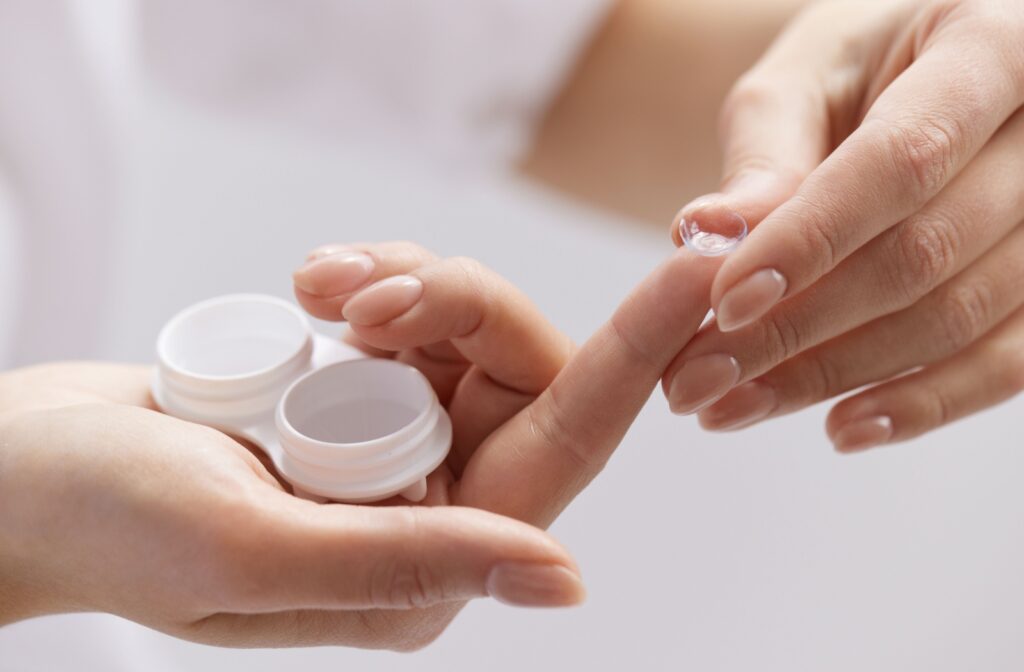It can be frustrating when every blink leads to dryness or irritation. But for people with sensitive eyes who wear contacts, this can be the grim reality.
Fortunately, there are often solutions. The best contacts for sensitive eyes are daily disposable lenses made from breathable silicone hydrogel that helps retain moisture. Comfort depends on choosing the right material, maintaining hydration, and avoiding buildup that can aggravate sensitivity.
What to Look for in Contact Lenses for Sensitive Eyes
Not all contact lenses are created equal, especially for those with sensitive eyes. When choosing the right contacts, here are some factors to consider:
Material Matters
Modern contact lenses are made from a range of materials, but for sensitive eyes, silicone hydrogel lenses are often the best choice. Why? They allow more oxygen to pass through to your eyes, preventing dryness and irritation.
Moisture-Retaining Technology
For those prone to dry eyes, lenses with built-in moisture retention are helpful. Some contact lenses are even designed to mimic the natural tear film in your eyes, such as those from Acuvue, which help keep your eyes hydrated throughout the day.
Lens Replacement Schedule
Daily disposable lenses are a top pick for sensitive eyes. Fresh pairs every day mean less chance of protein or allergen buildup, reducing irritation over time. If dailies aren’t your preference, ensure you follow the cleaning routine for bi-weekly or monthly lenses meticulously.
UV Protection
Ultraviolet rays can exacerbate sensitivity. Many modern contacts come with built-in UV protection, shielding your eyes from harmful rays and minimizing discomfort. By prioritizing these features, you’ll find lenses that not only fit well, but are also kind to your eyes.
Choosing the Right Lens Material
Sensitive eyes can react differently to various contact lens materials. To avoid irritation:
- Avoid traditional hydrogel lenses if you experience dryness, as they retain less water compared to silicone hydrogel lenses.
- Opt for silicone hydrogel lenses, which allow more oxygen to pass through, keeping your eyes healthier and more comfortable.
- Consider daily disposable lenses to minimize exposure to cleaning solutions and buildup of deposits.
The material you choose for your contact lenses can make a big difference in comfort and eye health.
Taking Care of Sensitive Eyes
If you have sensitive eyes, maintaining comfort while wearing contacts is recommended. Here are some helpful tips:
- Keep your contacts clean: Always follow the recommended cleaning routine for your lenses to avoid irritation or infections.
- Stay hydrated: Drinking plenty of water helps keep your eyes naturally moisturized.
- Use eye drops: Opt for preservative-free artificial tears to prevent dryness and discomfort.
- Take breaks: Give your eyes time to breathe by removing your lenses after extended wear.
- Practice good hygiene: Always wash and dry your hands thoroughly before handling your lenses. This prevents bacteria and allergens from coming into contact with your eyes.
- Consult an eye care professional: Regular checkups ensure you’re using the best lenses for your eyes.
Taking care of your eyes can lead to a more comfortable experience with your contact lenses.
Common Mistakes That Might Worsen Eye Sensitivity
Even with the right lenses, certain habits can still cause irritation for sensitive eyes. Here are a few common mistakes to avoid:
- Wearing lenses for too long: Overwearing contacts reduces oxygen flow and increases dryness.
- Sleeping in contact lenses: Unless your contacts are specifically designed for overnight use, wearing them while you’re asleep increases your risk of infection and discomfort.
- Using expired contact solution: Old or contaminated solution can introduce irritants and bacteria.
- Wearing lenses past their replacement date: Even if they feel fine, buildup of protein and allergens can aggravate your eyes.
- Staring at screens without blinking enough: This reduces tear distribution and leads to evaporative dryness.
- Applying makeup or skincare too close to the eye: Oil-based products and particles can get on lenses and cause irritation.
- Inserting lenses after applying makeup: Consider inserting your contacts before applying cosmetics to reduce contamination risk.
Small adjustments in daily habits can make a big difference in long-term comfort.

Can You Still Wear Contacts If You Have Chronic Dry Eye?
If you have chronic dry eye or other conditions that impact your comfort while wearing lenses, you may benefit from specialty contact lenses.
Scleral lenses, for instance, are larger in diameter and create a reservoir of moisture under the lens, providing additional comfort for those with severe dry eye. Speak with your optometrist about these options.
How Can We Help?
At Total Vision San Francisco, we understand how frustrating it can be to experience discomfort with your contacts. That’s why our optometrists are dedicated to helping you find the fit for your unique needs.
Switching to the right contact lenses can transform your vision experience. With so many options designed for sensitive eyes, you have many options to help reduce discomfort.
Book your contact lens exam with us at Total Vision San Francisco and take the first step toward a clearer, more comfortable future. Your eyes deserve nothing but the best care.



